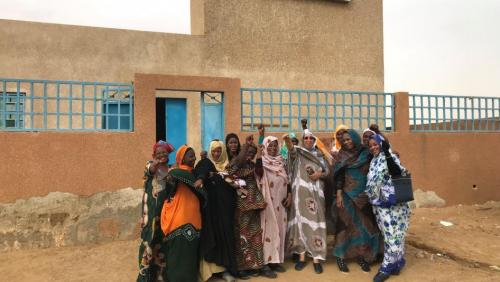Mauritania: Take Key Steps for Women’s Rights
Take Decisive Steps to Improve Women’s Rights
Mauritania’s President Mohamed Ould Ghazouani should prioritize women’s rights during his administration, Human Rights Watch said in a letter to the new president on Oct 15, 2019. In particular, he should take steps to reduce the high incidence of gender-based violence and ensure that victims have access to justice.

Aminetou Mint Ely [center, holding phone], president of the Association of Women Heads of Family and staff of a support center for survivors of gender-based violence, run by the association, Rosso, Mauritania, February 7, 2018.
After extensive research on the ground in 2018 and 2019, Human Rights Watch found that the lack of strong laws on gender-based violence and of institutions to provide assistance to victims, along with social pressures and stigma, dissuade women and girls from seeking help and remedies when they are abused. The authorities provide inadequate medical, mental health, and legal support services to victims, letting nongovernmental organizations fill the protection gap as best they can with limited means. In addition, survivors of rape who complain to authorities risk prosecution for engaging in sexual relations outside marriage if they cannot convince the court that they were raped.
“President Ould Ghazouani should set a new tone for his presidency by demonstrating zero tolerance for gender-based violence,” said Sarah Leah Whitson, Middle East and North Africa director at Human Rights Watch. “Mauritania’s women should not have to suffer rape and other forms of violence in silence.”
The authorities in Mauritania should stop prosecuting or detaining men and women in cases of sexual relations outside of marriage, known as zina. Human Rights Watch said the government should also decriminalize this offense, to harmonize Mauritanian laws with international conventions protecting the right of privacy and personal autonomy.
Ould Ghazouani should press parliament to pass a pending 2016 draft bill on gender-based violence. He should ensure that the law defines rape in terms broader than the definition in the current draft, and that it criminalizes all other forms of sexual violence.
The president should also support eliminating from the penal code all punishments that amount to cruel, inhuman, and degrading treatment, such as death by stoning or flogging – even though Mauritania has an effective current moratorium on carrying out such punishments.
The government should allocate more funding to assisting victims of violence, such as by establishing short-term and long-term shelters, and by creating specialized prosecutorial units to pursue sexual violence cases.
Mauritania should also remove all its remaining reservations to articles 13(a) and 16 of the international Convention on the Elimination of All Forms of Discrimination against Women, which relate to eliminating discrimination involving family benefits and requiring equality in marriage and family matters.
Source:Human Rights Wach
- 416 reads
Human Rights
Fostering a More Humane World: The 28th Eurasian Economic Summi

Conscience, Hope, and Action: Keys to Global Peace and Sustainability

Ringing FOWPAL’s Peace Bell for the World:Nobel Peace Prize Laureates’ Visions and Actions

Protecting the World’s Cultural Diversity for a Sustainable Future

Puppet Show I International Friendship Day 2020

